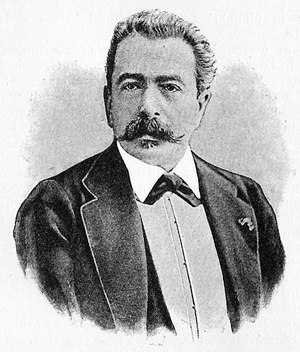Józef Wieniawski: Difference between revisions
Tchaikovsky Research
m (1 revision imported) |
mNo edit summary |
||
| Line 2: | Line 2: | ||
Polish pianist and composer (b. 23 May 1837 in Lublin; d. 11 November 1912 in [[Brussels]]). | Polish pianist and composer (b. 23 May 1837 in Lublin; d. 11 November 1912 in [[Brussels]]). | ||
Showing musical talent from an early age he toured France and other European countries giving recitals with his brother, the violinist Henryk | Showing musical talent from an early age he toured France and other European countries giving recitals with his brother, the violinist Henryk Wieniawski (1835–1880). From 1866 to 1869 he was a professor at the [[Moscow]] Conservatory, where he came to know Tchaikovsky. From 1870 he lived and worked in [[Warsaw]], and was a founding member of the Warsaw Music Society. In 1878 he was appointed professor at the [[Brussels]] Conservatory, where he spent the rest of his days. | ||
==Correspondence with Tchaikovsky== | ==Correspondence with Tchaikovsky== | ||
Revision as of 19:31, 18 November 2022
Polish pianist and composer (b. 23 May 1837 in Lublin; d. 11 November 1912 in Brussels).
Showing musical talent from an early age he toured France and other European countries giving recitals with his brother, the violinist Henryk Wieniawski (1835–1880). From 1866 to 1869 he was a professor at the Moscow Conservatory, where he came to know Tchaikovsky. From 1870 he lived and worked in Warsaw, and was a founding member of the Warsaw Music Society. In 1878 he was appointed professor at the Brussels Conservatory, where he spent the rest of his days.
Correspondence with Tchaikovsky
One letter from Tchaikovsky to Józef Wieniawski has survived, dating from 1892, and has been translated into English on this website:
- Letter 4837a – 30 December 1892/11 January 1893, from Brussels.

